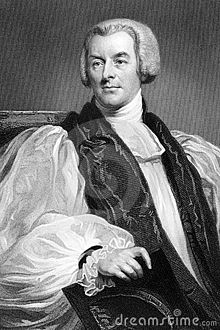Lord George Murray (bishop)
George Murray | |
|---|---|
| Bishop of St David's | |
 | |
| Church | Church in Wales |
| See | Diocese of St David's |
| In office | 20 December 1800 –3 June 1803 |
| Predecessor | William Stuart |
| Successor | Thomas Burgess |
| Orders | |
| Consecration | 11 February 1801 |
| Personal details | |
| Born | 30 January 1761 |
| Died | 3 June 1803 (aged 42) |
| Spouse |
Anne Charlotte Grant
(m. 1780) |
Lord George Murray (30 January 1761 – 3 June 1803) was an Anglican cleric best remembered for his work developing Britain's first optical telegraph, which began relaying messages from London to Deal in 1796, a few years after Claude Chappe's system began operation in France. He was Bishop of Saint David's from 1801 until his death.
Life
[edit]Murray was the second son of John Murray, 3rd Duke of Atholl. He was Archdeacon of Man from 1787 to 1801, a post for which his mother, Charlotte Murray, Duchess of Atholl, was the patroness.[1]
On 19 November 1800, Murray was nominated bishop of St. David's. He was elected on 6 December, confirmed on 7 and consecrated on 11 February 1801.
He caught a chill waiting for his carriage on leaving the House of Lords, and died at Cavendish Square on 3 June 1803.[2]
Family
[edit]On 18 December 1780, he married Anne Charlotte Grant (bap. 9 August 1765 – 27 April 1844), Lady-in-Waiting to Queen Charlotte. He had nine children:[citation needed]
- Charlotte Sophia Murray (1785–1866); married Rev. Townshend Selwyn (1782–1853), Canon of Gloucester.
- George Murray (12 January 1784 – 16 February 1860); Bishop of Sodor and Man and Bishop of Rochester
- Louisa Ann Murray (29 May 1790 – 21 February 1871); married Sir Robert Frankland-Russell, 7th Baronet. They had five daughters.
- Amelia Matilda Murray (30 April 1795 – 7 June 1884)[3]
- Rev. Edward Murray (5 November 1798 - 1 July 1852); married Ruperta Catherine Wright, daughter of Sir George Wright, 2nd Baronet and Rebecca MacLane. They had two sons, and two daughters.
- Henry Murray (1 February 1800 – 26 November 1830); married the Hon. Catherine Otway-Cave, daughter of Henry Otway, and Sarah Otway-Cave, 3rd Baroness Braye. They had no children.
- Caroline Leonora Murray (d. 8 January 1819); married Henry Fox-Strangways, 3rd Earl of Ilchester, and had two sons and two daughters.
- John Murray (d. 1803)
- Charles Murray (d. January 1808)
References
[edit]- ^ "Archdeacons: Man Pages 146-150 Fasti Ecclesiae Anglicanae 1541-1857: Volume 11, Carlisle, Chester, Durham, Manchester, Ripon, and Sodor and Man Dioceses". British History Online. Institute of Historical Research, 2007. Retrieved 30 January 2024.
- ^ Pollard 1894.
- ^ K. D. Reynolds, 'Murray, Amelia Matilda (1795–1884)', Oxford Dictionary of National Biography, Oxford University Press, 2004 accessed 3 Feb 2015
- Attribution
 This article incorporates text from a publication now in the public domain: Pollard, Albert Frederick (1894). "Murray, George (1761-1803)". In Lee, Sidney (ed.). Dictionary of National Biography. Vol. 39. London: Smith, Elder & Co. p. 361.
This article incorporates text from a publication now in the public domain: Pollard, Albert Frederick (1894). "Murray, George (1761-1803)". In Lee, Sidney (ed.). Dictionary of National Biography. Vol. 39. London: Smith, Elder & Co. p. 361.
External links
[edit]- capsule biography, from the Gazetteer for Scotland
- essay on his invention, from the Friends of Carmarthen County Museum
